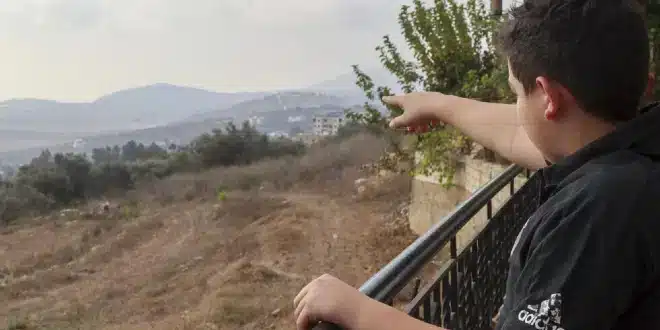Lebanese Christian Joseph Jarjour had hoped for a peaceful retirement in his hometown of Rmeish in southern Lebanon, but instead, he now finds himself in the middle of the ongoing conflict between Israel and Hezbollah.
“We’re trapped,” said the 68-year-old retired teacher from Rmeish, a village located just two kilometers from the Israeli border.
Following nearly a year of cross-border skirmishes, Israel launched a series of airstrikes on Hezbollah strongholds and initiated a ground offensive late last month.
Rmeish, along with other Christian villages in southern Lebanon, has largely been spared the worst of the violence, but remains caught in the crossfire between the two sides.
“When Israel bombards, it flies over our heads. And when Hezbollah fires back, it also whizzes by above us,” Jarjour told AFP over the phone during a rare moment of internet access.
“We’re peaceful people, we have no weapons, and we have never liked war,” he said. “We want to stay in our homes and not have to take sides.”
Since the escalation began on September 23, more than 1,200 people have been killed in Lebanon, and a million others have been displaced, according to Lebanese health ministry figures.
Jarjour added that escaping from Rmeish was difficult as the roads out of the village were unsafe, making it “very hard” to reach the capital, Beirut.
– ‘Hostages’ –
Milad al-Alam, the mayor of Rmeish, a village known for its red-roofed houses and tobacco fields, said most of its 6,000 residents have stayed despite the conflict. However, the walls of several houses have cracked from nearby explosions, and the delivery of fresh produce has stopped.
To make matters worse, hundreds of people, mostly Christians fleeing neighboring areas, have sought refuge in Rmeish.
“Life has been at a standstill since October 2023,” said Alam, noting that most businesses have shut down since the fighting began.
Hezbollah and Israel have been long-standing adversaries, and since Hezbollah opened a front in support of Hamas following the October 7 attack on Israel, fighting has intensified.
“Anyone who had savings has spent them over the past few months,” Alam said.
During the 2006 war between Israel and Hezbollah, most of Rmeish’s residents remained in the village. Recently, Alam managed to organize a delivery of humanitarian aid to the area, under the protection of the Lebanese Army and U.N. peacekeepers.
“But we can’t replace the state,” he said, lamenting Lebanon’s political paralysis and ongoing financial crisis since 2019.
Christian-majority villages have largely been spared the recent bombardments, unlike neighboring Shiite-majority areas, which have seen widespread destruction and evacuation.
In January, Maronite Patriarch Beshara al-Rahi, the spiritual leader of Lebanon’s largest Christian community, said that villagers along the border had become “hostages” bearing the brunt of the conflict.
Lebanon is home to 18 officially recognized religious communities, with Christians making up about 30 percent of the population.
– ‘Bound to our land’ –
Last week, the Israeli military warned residents of southern Lebanon to leave their homes as it prepared for “limited” ground incursions across the border.
However, in the village of Qlayaa, just four kilometers from the border, hundreds of families have remained in their homes despite fuel and medicine shortages, and the closure of the nearest hospital.
Priest Pierre al-Rahi said they had stayed because they were “believers tied to their land.”
“We’ve done everything to avoid military operations or installations here,” he added.
Israel occupied the village from 1982 until 2000, during which time some Lebanese Christians sided with Israel while others opposed the occupation.
In the mornings in Qlayaa, home to a statue of Saint George, few people venture outside as the sound of bombardment echoes overhead.
Pauline Matta, a mother of four children aged four to 18, said she broke down in tears when she saw Israel’s warning to evacuate.
The 40-year-old is constantly on edge. “I can’t stand the sound of shelling or Israeli planes anymore. I scream whenever I hear them,” she said.
Despite her fear, she cannot imagine leaving her home or how her family would survive elsewhere on her husband’s modest army salary.
“This war was forced on us. We have nothing to do with it. Why should we leave?” she asked. “I am determined to stay.”


